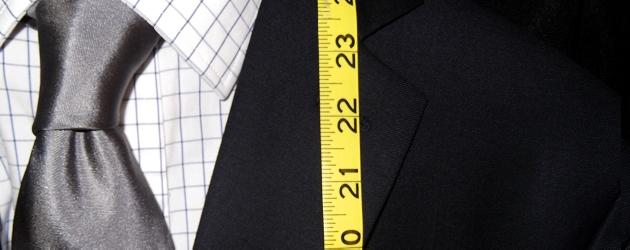Fit isn’t everything, but it’s awfully close. When you’re on a serious budget, compromising on fit in some areas can be worth considering or sometimes even a necessity. But there are other areas where you just shouldn’t settle for a so-so fit no matter how good the deal happens to be. Here’s where fit matters, in order of importance…
#1. Shoulders – Suits jackets, blazers, sport coats, shirts, and polos.
The fit through your shoulders is like the engine in your car. If it’s bad, forget all the rest. On average, American men wear their jackets about a size too big. And it completely shows up in the shoulders. It needs to fit here off the rack since a tailor can’t adjust them. Too big and you’ll look like a kid wearing something from Dad’s closet. Too small and you’ll look (and feel) constricted. To get the right fit, put on the jacket and stand next to a wall. Slowly lean into the wall with your shoulder. If the pad of the jacket strikes first, scrunches up, and your shoulder then follows a bit later, it’s too big. They need to hit at the same time. You want a jacket shoulder that follows the lines of your body, not one that creates new ones. For shirts, the seam should go on your shoulder. Not halfway to your elbow.
#2. The Waist – Jackets, Shirts, and Sweaters
Your waist is a terrible thing to waste. That goes for the heavier fellas too. Even if you’re hauling some extra pounds, failing to get your shirts tailored or your jackets brought in a touch at the sides could leave your BMI looking much higher than your actual number. Do you need to have EVERY shirt brought in? No. Of course not. If it fits then it fits. And if it doesn’t but you can’t invest right now? Wear a tailored sport coat or a well fitting sweater over it.
#3. Shoes
If you’re not comfortable in your shoes you’ll only look great while sitting down. Which is too bad, since that well tailored jacket looks even better when you’re standing up. Limping around with heel blisters or smashed toes isn’t good for your look. If you’re hard to fit, accept it, and stick with brands and widths you can walk a few miles in. If you’ve got a pair of shoes that are a little too big, these might help.
#4. Jacket Length
There is an immense amount of debate over how long a sportcoat, blazer, or suit jacket should be. Some say: 100% butt coverage. But if you’ve got a long torso and shorter legs, covering all of your rear might leave you looking unbalanced and stumpy. Another method is to put on the jacket then curl up your fingers as seen below. The goal is to have the tail hit right in that valley of your grip, without it bunching or coming up noticeably short.

#5. Pant length or “Break”
No break means that when standing, your pant legs will be pretty close to stick straight since they’re short enough that they’re barely brushing the horizontal plane of your shoes. Medium break means they’ll kink and dent in a little, but still show some sock when you sit down and put one leg over the other. Full break is piles of fabric at your ankle. Go somewhere between no break and medium break (more from the Effortless Gent here.)
#6. Shirt Neck
It has to be comfortable but not cavernous when buttoned all the way up. Too small and it gets regulated to only tieless duty (or you’re stuck depending on a collar extender.) Too big and it looks sloppy. You want a collar that gets almost right up to your skin, but doesn’t choke. It’s like a pair of shoes. You’ll know if it’s too loose or too tight.
#7. Sleeve Length – Jackets and Shirts
Showing 1/4″ – 1/2″ of shirt cuff is ideal, but unless you’re walking around with your arms glued to your sides, your jacket sleeves are going to move around a little. Some brands (looking at you L.L. Bean Signature) make incredible blazers and jackets with slightly longer sleeves and tough to tailor functioning buttons. Sometimes it’s worthwhile to ignore it if it’s close and the price is better than good. For shirts, sleeve length should cover your wrist but not drift into the palm of your hand. Look for a shirt cuff that ends right where the meat of your thumb muscle begins when you’ve got your arms are at your sides.
#8. Pant Waist
Along with hiding an un-ironed shirt, a sport coat or blazer can do a fine job of covering up a pant waist that’s a little loose. But if you want to go beltless, that thing better be perfect.
#9. Tie Length
This can often be covered up by a jacket or sweater, but the end of your tie should hit your belt buckle. The middle of the buckle is the bull’s eye. It’s a small detail that makes a big difference. If you like big knots, consider longer ties.
#10. Shirt Tail Length
There’s a real simple solution for shirts that are too long to be worn untucked. Tuck the things in. It’s borderline sad to see some younger guy enjoying a night out while wearing an untucked traditional fit dress shirt. It’s reminiscent of those smocks we all had to wear in kindergarten when it was time to finger-paint. Untucked casual shirts shouldn’t drift much farther south than a few inches past your belt. Covering the entire fly of your pants is pushing it.
Agreements, disagreements, and other suggestions should go in the comments… Originally Published 11/15/11
